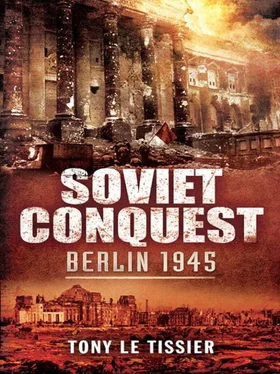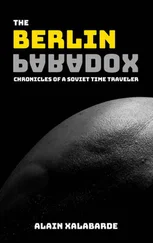We crossed the Landwehr Canal and reached the Tiergarten. This once splendid piece of earth had changed into a rubbish heap, into a cemetery for tanks, guns and vehicles. Torn up trees, water channels, destroyed bridges and bomb craters completed the chaos. The fire of war had not improved the wide Siegesallee. The statues of the illustrious Wilhelms, Friedrichs and former Prussian military leaders had been toppled from their bases.
Until his cowardly suicide, Goebbels had prophesied that life would cease as soon as the Red Army appeared. Like so many things, it was also a lie. The firing was hardly over when life in the destroyed city stirred once more. The first thing was the children leaving the cellars. At first they came timidly closer and then ever more boldly to our field kitchens and looked at the cooks with big, hungry eyes. Pity stirred our soldiers and soon the children were squatting round our gulash cannons. But not only did they satisfy their hunger, but they also took some soup for their relatives.
Then we stood in the Reichstag, which looked grey, dusty and bombed-out. The heavy fighting had left its traces here, as elsewhere in Berlin and in Germany overall.
As we were about to go in, it seemed to me as if the building was swaying. It reminded me instinctively of a pirate ship. The interior of the building was murky, damp and cold. On the floors lay heaps of rubble, and through a gaping wall one could see the Brandenburg Gate.
We were not the only ones to come here. Hundreds of vehicles stood nearby and thousands of Soviet soldiers examined and touched the damaged pillars and walls. Wherever one looked one saw inscriptions everywhere. ‘We made it!’ ‘We are from Moscow’ ‘We are from Leningrad’, ‘My way led from Stalingrad to Berlin’. Everyone regarded it as their right to record their name on the walls of the Reichstag. It seems as if this would confirm our victory.
The brigade staff were impatiently awaiting my return. An unusual amount of activity reigned in the building. Schalunov received me with the news. ‘An order arrived during your absence. The brigade is to drive out of Berlin during the night and concentrate near the Teufelsee lake south of Eichkamp.’
On the table lay a map. My chief of staff had already established the route and informed me about the already issued orders. Why would this be good, I thought. Schalunov also had no answer. We went through various alternatives and soon lost ourselves in conjecture.
I had not spoken to General Novikov again since the death of his son. Now that the order had come to prepare to march, I dared to call him. Some questions needed an urgent reply, and above all we needed refuelling. The corps commander spoke quietly and assuredly. ‘I understand your concern. It is no different with Sliussarenko and Tschugunkov. However, the enemy is no longer the same. The beast has been badly hit and your forces are sufficient for the final blow. Naturally we will help you.’
‘Nevertheless, please allow me the question, Comrade General, what should we be ready for?’
‘Tomorrow we will set off for the new area.’
‘Where to?’
‘I still have no orders, but before us is a march of several hundred kilometres.’
‘To the Rhine?’
‘What would we do there? Our allies have occupied this area long since. Don’t pester me any more, I cannot tell you any more. We will get the order tomorrow.’
About an hour later we received maps of the areas Wittenberg, Dresden, Sudety and Prague. Then petrol tankers arrived. ‘Take note, lads,’ said the garrulous tanker driver informatively. ‘There is no more fuel until Prague.’
We left Berlin during the night, the column creeping slowly down the Heerstrasse. Eight days previously we had come in over this road.
* * *
The German edition of Dragunski’s book does not mention that he and his brigade holed up in the big tram sheds and adjacent apartments on Saarstrasse, a block north of the Kaiserdam, for their last two days in Berlin, as was mentioned in his A Soldier’s Life, published by Progress Publishers in Moscow in 1977 .
Dragunski’s brigade formed part of Marshal Koniev’s forces that liberated Prague a few days later but was not actually involved in the fighting. He then commanded the contingent of one hundred selected representative tank soldiers at the victory parade in Moscow, continuing to serve until retiring with the rank of general .
* * *
Towards morning we reached the woods south of Berlin and settled down for a rest. The soldiers slept wherever they could find a place. They disregarded food and drink in order to catch up on more than twenty nights of lost sleep. Since the 16th April, the beginning of the Berlin operation, they had had no rest.
At midday our encampment was still deep in slumber. Only on the headquarters bus had several officers gathered to wait for instructions. The chief of staff and I studied the corps commander’s orders. We marked the given points on the map and confirmed the route as well as the provisional plan for further action. Our 7th Tank Corps belonged to a strong armoured force being formed on Marshal Koniev’s orders from the 3rd and 4th Guards Tank Armies as well as several independent tank and mechanised corps. This powerful force was to destroy the million-strong army of the Fascist Field Marshal Schörner, whose Army Group Mitte was the last card in the Fascists’ hands, and on which they now were concentrating their last hopes.
Apparently the fate of this army group was already decided. The capitulation of the Berlin garrison was a sure indication that our troops had broken the back of the Fascist beast. But we also knew very well how the vastly strong enemy group in Czechoslovakia could prepare, what the tightly squeezed Fascists were still capable of. This was why the Front commander-in-chief demanded single-minded handling. We would attack the enemy in the flank, split him up, forcing him to be destroyed or to capitulate. In no circumstances would Prague be destroyed.
General Novikov had ordered us to march off at nightfall. A penetrating signal tore through the quiet of the woods. Several hours’ sleep had strengthened the men and now they made the last preparations for the march. The commanders and political workers explained the fighting roles and talked about Czechoslovakia and its people.
As nightfall sank, we headed south. Before us lay a march of some 200 kilometres. I climbed out of my Jeep into a car. Dmitriev and Ossadtchi came with me.
The traffic regulators showed us the route through Luckenwalde, Jüterbog and Dahme, and towards morning the brigade reached the woods north of the Elbe. It was only later that we learnt that we were marching parallel to the front line and that Dresden and the surrounding area were still in the hands of the enemy. The 344th German Infantry Division and the 2nd Panzer Division with reserve and security units were defending south of Riesa and on the line Heyda–Dörschnitz–Nieschütz–Niegeroda.
In the evening, before reaching the deployment area, the corps commander and head of the political department sought us out. We were very happy to see General Novikov in good form again. I reported on the condition of the brigade and on our chances in the anticipated fighting, and complained about the weak infantry and big losses of tanks. ‘I am afraid that our tanks will not make it over the mountains. Many are smoking a lot, the engines need replacing. Their running times are well over-exceeded.’
The general looked at me in astonishment. ‘I don’t recognise you. You are talking like a technical equipment assistant. Even if only half of your tanks reach Prague, that’s no tragedy. The war is coming to an end and you start to complain. There is no cause to panic. You will get your infantry. I have already given the instructions. You will get a rifle battalion from Schapovalov’s brigade.’
Читать дальше












